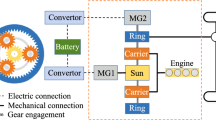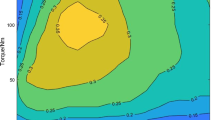Abstract
The energy management may perform well under normal conditions, but may lead to poor behavior under abnormal situations. To tackle this problem, an optimal control strategy called rule-based equivalent fuel consumption minimization strategy (RECMS) is developed for a new complex hybrid electric vehicle (CHEV). It optimizes the energy efficiency and drive performance to cater for normal and power-loss operations of the tractive motor. Firstly, the strategy formulates a novel objective function based on the equivalent fuel concept. By accounting for the actual fuel cost, the equivalent fuel cost for the electric machines and virtual fuel cost for the drivability, the cost function is obtained. Furthermore, some penalty factors are presented to optimize the performance target. Finally, experiments for a practical CHEV are performed to validate a simulation model. Then simulations are carried out for both rule-based and RECMS. The results show that the optimal energy management is working well.
Similar content being viewed by others
Abbreviations
- E tot,dis :
-
Total discharging energy of the battery, J
- i b :
-
Battery current, A
- m bs :
-
Brake-specific fuel consumption, g/(kW· h)
- m T :
-
Total fuel, g
- m tot,vfuel :
-
Total virtual fuel for E tot,dis, g
- .m :
-
Fuel mass in unit time, g/s
- -m :
-
bs-Mean brake-specific fuel consumption, g/(kW·h)
- P :
-
Power, kW
- P load :
-
Load power before the final drive and after the AMT, kW
- P ool :
-
Optimal operation power of engine, kW
- Q LHV :
-
Lower heating value of the fuel, 43 kJ/g
- R b :
-
Battery resistance, Ω
- SoCH, SoCL :
-
Upper and Lower bond of battery SoC
- T :
-
Torque, N·m
- uoc :
-
Open circuit voltage of the battery, V
- v :
-
Vehicle speed, km/h
- v error :
-
Vehicle speed error, km/h
- ΔE chg :
-
Energy added to the battery during Δt, J
- Δm vfuel :
-
Virtual fuel for ΔE chg, g
- Δt :
-
Time interval, s
- η :
-
Efficiency
- η bc, η bd :
-
Battery charge, discharge efficiency
- \( \bar \eta e \) :
-
Mean fuel conversion efficiency of the engine
- ω :
-
Speed, r/min
- b:
-
Battery
- e:
-
Engine
- m1:
-
ISG
- m2:
-
Motor
- r:
-
Reduction gears
- t:
-
AMT
References
Chan C C. The state of the art of electric, hybrid, and fuel cell vehicles [J]. Proceedings of the IEEE, 2007, 95(4): 704–718.
Liu J, Peng H. Control optimization for a power-split hybrid vehicle [C] //Proceedings of the 2006 American Control Conference. Minneapolis, Minnesota: IEEE, 2006: 467–471.
Lin C C, Peng H, Grizzle J W, et al. Power management strategy for a parallel hybrid electric truck [J]. IEEE Trans Control Sys Tech, 2003, 11(6): 839–849.
Koot M, Kessels J, Jager B, et al. Energy management strategies for vehicular electric power systems [J]. IEEE Trans Vehicle Tech, 2005, 54(3):771–782.
Pisu P, Rizzoni G. A comparative study of supervisory control strategies for hybrid electric vehicles [J]. IEEE Trans Control Sys Tech, 2007, 15(3): 506–518.
Sciarretta A, Guzzella L. Control of hybrid electric vehicles [J]. IEEE Control Systems Magazine, 2007, 27(2): 60–70.
Zhu Y, Chen Y, Tian G, et al. A four-step method to design an energy management strategy for hybrid vehicles [C]//Proceedings of the 2004 American Control Conference. Boston, MA: IEEE, 2004: 156–161.
Yoon H, Lee S. An optimized control strategy for parallel hybrid electric vehicle [DB/OL]. (2003-03-03) [2008-02-25]. http://www.sae.org/technical/papers/2003-01-1329.
Paganelli G, Guezennec Y, Rizzoni G. Optimizing control strategy for hybrid fuel cell vehicle [DB/OL]. (2002-03-04) [2008-02-25]. http://www.sae.org/technical/papers/2002-01-0102.
Pisu P, Koprubasi K, Rizzoni G. Energy management and drivability control problems for hybrid electric vehicles [C]// Proceedings of the 44th IEEE Conference on Decision and Control, and the European Control Conference. Seville, Spain: IEEE, 2005: 1824–1830.
GB/T 19754-2005, Test methods for energy consumption of heavy-duty hybrid electric vehicles [S] (in Chinese).
Delprat S, Lauber J, Guerra T M, et al. Control of a parallel hybrid powertrain: optimal control [J]. IEEE Trans Vehicle Tech, 2004, 53(3): 872–881.
Zhang P Z, Ying C L, Zhang J W, et al. Integral power management strategy for a complex hybrid electric vehicle: Catering for failure of individual component [J]. Proceedings of the Institution of Mechanical Engineers. Part D: Journal of Automobile Engineering, 2008, 222(D5): 719–727.
Author information
Authors and Affiliations
Corresponding author
Additional information
Foundation item: the National High Technology Research and Development Program (863) of China (No. 2006AA11A127)
Rights and permissions
About this article
Cite this article
Zhang, Pz., Yin, Cl., Zhang, Y. et al. Optimal energy management for a complex hybrid electric vehicle: Tolerating power-loss of motor. J. Shanghai Jiaotong Univ. (Sci.) 14, 476–481 (2009). https://doi.org/10.1007/s12204-009-0476-6
Received:
Published:
Issue Date:
DOI: https://doi.org/10.1007/s12204-009-0476-6
Key words
- optimal energy management
- hybrid electric vehicle
- control strategy
- equivalent fuel consumption
- power-loss




